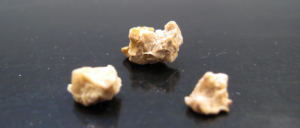
What causes a person to develop kidney stones has long been debated. A recent study found that in persons who develop kidney stones, there are alterations in the gut, salivary, and urinary microbiomes. In other words, the community of fungi, viruses, and bacteria at each of these sites are out of whack or imbalanced.
In the study, not only were the 3 microbiomes imbalanced in the persons with kidney stones (when compared to healthy people without kidney stones), but they also had less diversity (fewer species) in their microbiomes. For example, persons with kidney stones had significantly fewer gut health associated bacteria F. prausnitzii, and significantly more inflammation associated E. lenta.
Those with kidney stones also had a history of having taken more antibiotics (antimicrobials).
The researchers conclusion: To avoid kidney stones a healthy diet is essential (for a healthy gut microbiome). One should also avoid taking antibiotics unless necessary. [BTW, the bacteria F. prausnitzii has long been viewed as a keystone microbe in a healthy gut microbiome. It can be increased by increasing fiber in the diet - e.g., fruits, vegetables, seeds, nuts, whole grains, legumes.]
From Medical Xpress: New study sheds light on the connection between the microbiome and kidney stones
A new study from Lawson Health Research Institute and Western University published in the journal Microbiome has found changes in the microbiome in multiple locations in the body are linked to the formation of kidney stones. ...continue reading "Kidney Stones and the Gut Microbiome"
